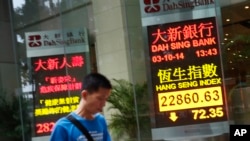The official China National Tourism Administration is barring trips to Hong Kong by tour groups from the country’s mainland. The order marks a change in the way China’s government is seeking to control the Hong Kong special administrative area. Some observers say the government wants to create divisions within the city.
More than 40 million people from mainland China visit Hong Kong each year. They represent the largest group of visitors to the city. Joseph Tung is head of Hong Kong’s Travel Industry Council. He says many non-Chinese have chosen not to travel to Hong Kong while democracy protests are taking place. He says the government order will hurt the city’s tourism industry.
“The number of groups is around 300 a day. But according to the information we received, although this is not confirmed, because we do not have the (confirmed) document from mainland China agents, they received instruction that they are going to stop promoting tours to Hong Kong.”
Michael DeGolyer is the director of the Hong Kong Transition Project. He predicted the ban would be put in place just hours before it was announced. The order forms part of what Mr. DeGolyer calls the ‘Anaconda scenario’, named after the big snake. He believes China wants to slowly kill the Hong Kong democracy movement.
Fewer tourists will lead to a loss of jobs in the travel industry, perhaps as early as next week. The ban may also lead to pressure on the Hong Kong dollar. Another possibility could be the de-listing, or removal, of companies from the Hang Sang stock market because of global investors’ worries about the local economy.
“The objective or strategy of this movement is to increasingly turn the population against the students or the leaders of Occupy Central, because of this slowly increasing economic pain. And so there are various ways, without going back to tear gas and using force, of increasing pressure on students and supporters of Occupy Central to back down.”
The protestors want China to permit democratic elections in 2017. And they want the territory’s leader to leave office. The protests are the largest forms of unrest in Hong Kong since China took control of the former British colony in 1997.
Tired democracy activists say China’s order will not cause them to stop their protests. Many of them consider the order just the latest in a series of attempts by China to keep news about the democracy movement from entering the mainland.
Activist Bernard Luk says tourism is responsible for less than five percent of Hong Kong’s Gross Domestic Product -- the total value of goods sold and services within an area. And he says only 30 percent of Chinese visitors travel in organized tour parties.
“When mainland tourists come down to Hong Kong, they spend most of their money on luxury hotels, Gucci handbags, iPhones, that sort of high-end product which obviously contributes to the Hong Kong economy, but not directly. Do you get what I mean? All this money goes back, for example, to Gucci and Apple. It will have a very, very small impact on (the) grassroots.”
China could choose to take stronger action against citizens of Hong Kong. Michael DeGolyer notes that the city is largely dependent on the mainland for food and water supplies.
“If they really wanted to make Hong Kong surrender without firing a shot, they could simply say, ‘Okay, we’re going to give you complete autonomy -- no water, no mainland transport, no ships, no aircraft.’ And after a week to 10 days ask, ‘Okay; just how much autonomy do you want?’”
The dispute between Chinese officials and the protesters continues. And with each passing day, the next generation of Hong Kong citizens becomes increasingly unhappy with China’s leaders.
I’m Bob Doughty.
This story was reported by correspondents Ivan Broadhead in Hong Kong and Mike Richman in Washington. George Grow wrote it for Learning English. The editor was Christopher Cruise.
_____________________________________________________________
Words in This Story
administration – n. the activities relating to operating a company or other organization; a government of part of a government
between – adj. in the space or time that separates; from one to the other (“talks between two nations”)
control – v. to direct; to have power over
democracy – n. the system of government in which citizens vote to choose leaders or to make other important decisions
economy – n. the system by which money, industry and trade are organized
Now it’s your turn to use these Words in This Story. In the comments section, write a sentence using one of these words and we will provide feedback on your use of vocabulary and grammar.





